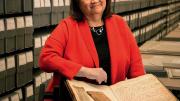“Want to see some cool stuff?” asks University archivist Megan Sniffin-Marinoff with an expectant grin, reaching for a library cart loaded with treasures from the vault. In one folder, a plaintive letter from then-undergraduate John Hancock to his sister in 1754 (“I wish you would spend one hour in writing to me…”); in another, pictured above, an 1837 “class book” in which senior Henry David Thoreau reflects on his Harvard career (“those hours that should have been devoted to study have been spent scouring the woods…”). There’s W.E.B. Du Bois’s 1895 doctoral dissertation, with his handwritten corrections; a 1980s Lampoon letter jacket; a 1963 interview request to Malcolm X from journalist Theodore White ’38. Harvard archivist since 2004, Sniffin-Marinoff grew up on Long Island and studied journalism at Boston University; working at local newspapers afterward, she found herself a researcher more than a reporter. A master’s at NYU—in history, with a secondary focus on archives—led to a job at NYU’s archives. Stints at Simmons College and MIT followed, then the deputy directorship at Radcliffe’s Schlesinger Library, and, finally, the post at Harvard. Its vast archives are the oldest of their kind in the country. She and her staff are finishing a project to digitize and catalog half a million colonial-period records; soon they’ll tackle the nineteenth century. Along the way, they’re finding long-buried stories of women and people of color indirectly documented in centuries-old diaries, letters, and ledgers. “We spend a lot of time thinking about what it means to ‘document Harvard,’” says Sniffin-Marinoff. One important answer: unearthing the hidden layers of a campus—and a country—“that was always more complex than it seemed.”
Harvard archivist Megan Sniffin-Marinoff
Harvard archivist Megan Sniffin-Marinoff
The University archivist on what it means to “document Harvard”

Megan Sniffin-Marinoff
Photograph by Stu Rosner
You might also like
At Harvard’s Beck-Warren House, Ghosts Speak Many Languages
The quirky 1833 home now hosts Celtic scholars.
Yesterday’s News
How a book on fighting the “Devill World” survived Harvard’s historic fire.
Yesterday’s News
A co-ed experiment that changed dorm life forever
Most popular
Explore More From Current Issue

A New Landscape Emerges in Allston
The innovative greenery at Harvard’s Science and Engineering Complex

How a Harvard and Lesley Group Broke Choir Singing Wide Open
Cambridge Common Voices draws on principles of universal design.






